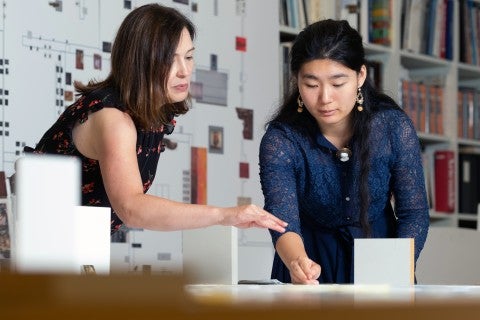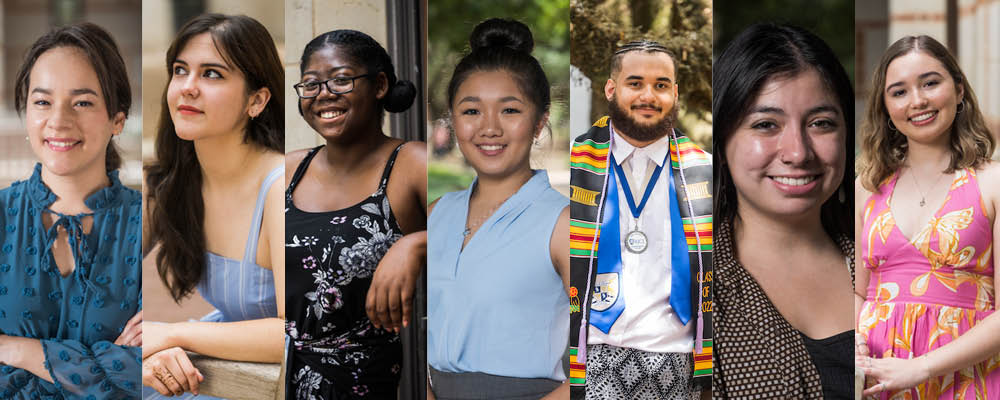What is humanities research? What kinds of post-graduation opportunities exist for students engaging in humanities inquiry? How can humanities students from underrepresented backgrounds get support for conducting research and/or applying to graduate school?
The Mellon Mays Undergraduate Fellowship Program at Rice offers answers to all of these questions and more. Established in 1988 and introduced at Rice in 1992, the fundamental goal of the program is to increase the number of minority students, and others with a demonstrated commitment to eradicating racial disparities, who will pursue PhDs in core fields in humanities and social sciences.
To follow are reflections from seven Mellon Mays fellows in the School of Humanities who have just graduated. They are diverse in their Rice experiences and plans for the future, but all are unified in their dedication to eliminating racial disparities in higher education and their rich research careers at the School of Humanities.
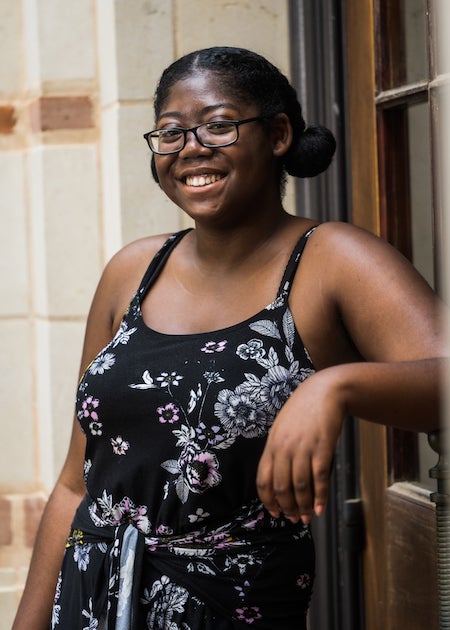
Jay Bethea
Majors: History, Ancient Mediterranean Civilizations, and Classical Studies
Minor: Business
Residential College: Baker
Hometown: Atlanta, Georgia
Research Area: Underrepresented Women in Classical Studies
How has being a Mellon Mays fellow impacted your Rice experience?
“It has given me a group of similar minded people to talk to about anything going on in undergraduate classes or preparing for grad school. Mellon has given me the space to really discuss some of the problems or challenges that I've run into and [has made me feel] like I'm not alone in running into them.
“It was a great opportunity [during] my sophomore year to force me to reach out to a mentor about doing a research project. I would not have started [a project] sophomore year if [MMUF] hadn't encouraged me to, but I would have been so sad if I hadn't started one at that time period. While I didn't know what was going on, Mellon pushed me to make that first step, and that branched off in ways that I couldn't even imagine. I will always be thankful for that.”
What lessons have you learned about being a humanities researcher?
“I've learned that research in the humanities is not one singular thing. There are many different types of projects, many different routes to explore. It's not just sitting down in a library and writing a paper, which I think is a common misconception in the humanities. I've done research on Cleopatra analyzing misconceptions [of her] in modern media. It has taken the age-old form of analyzing texts, but it has also [involved] taking that information to analyze plays, movies, TV shows, modern books across multiple different forms of media. It's not something I thought I could have done starting out researching humanities but that's the direction my research took.”
Is there one course, project, or experience that has been most transformative for you?
“Taking the research I did on Cleopatra and then teaching a class [COLL 100: Cleopatra: Untangling the Misconceptions] about it has been the most transformative thing. It really cemented the fact that I really do love teaching. Not only do I love researching these figures, but I also love sharing that information and discussing it and communicating it and informing others about an area that I saw a lack [in]. Most of the students were things like engineers and chemistry majors, and so most of them were coming in with zero knowledge [on Cleopatra]. At the end of the semester, we had an in-class debate where [students] argued various topics in modern scholarship about Cleopatra. These students who knew nothing are just spitting out specific details and facts. That amazed me, it was a great experience.”
What advice would you give to current and prospective humanities students?
“Don't be afraid to branch out. There are a lot of different departments in the humanities, and I think they all offer some things students can learn, whether that be a way to approach a topic or a subject you hadn't thought about. There's so much diversity in the humanities but they mesh in a very unique way. Don’t count out exploring a different topic that you find interesting just because it's not directly aligned with what you want to do long term. There's always something to learn. There's always something to discover. And even if you leave a class just thinking, ‘I had a good time. I'm not going to use it, but that was fun,’ at least now you know. Don't leave Rice wishing you would have taken that class.”
Jay will take a gap year before pursuing graduate studies in classical studies and/or women and gender studies.
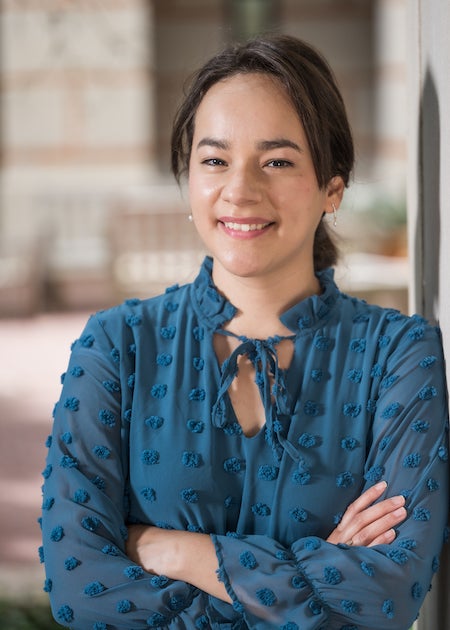
Isabella Bowers
Majors: Latin American Studies and Political Science
Minor: Spanish and Portuguese
Residential College: Hanszen
Hometown: Westminster, California
Research Area: Latin American and Latinx identities in the Americas
How has being a Mellon Mays fellow impacted your Rice experience?
“Mellon has been one of my favorite parts of being at Rice. When I attended my very first Mellon meeting, I was so impressed by how accessible and down-to-earth and kind everyone was. No one in my family had ever gotten a PhD, so I hadn’t considered the idea before. Participating in the Mellon meetings made it seem reachable. The Mellon fellowship has been an important space for me to learn about all those possibilities, like getting a PhD, going to grad school, and doing research. It has just been a key space to get to know my mentor and to get to share that common interest in humanities research with other students.”
What lessons have you learned about being a humanities researcher?
“Research in the humanities is awesome because there aren’t as many constraints as in some other disciplines. You can explore so many different ways of looking at the same topic, and what I've learned is to think outside the box, as cliché as it sounds. Most research about usage of the terms Hispanic and Latino is confined to a U.S. context, but I've tried to examine those terms with a more international, comparative lens, which I think could really help take the studies of those terms, and Latino studies in general, in a much clearer direction. Taking full advantage of the creativity that humanities research allows for has been invaluable.”
Is there one course, project, or experience that has been most transformative for you?
“There are so many! Of course, the class Intro to Latin American Studies was very transformative for me. When I first came to Rice, I didn't even know that there was such a thing as a major in Latin American studies. That's really where it all started.
“Later on, I took another class called Modern Latin America with a Brazilian professor and hearing her perspective as a Brazilian on Latin America was so interesting because often when we talk about Latin America in the United States, we think of Spanish-speaking Latin America. But hearing her talk about her identity as a Latin American made me question: what exactly does it mean to be Latin American? What countries count as part of Latin America? Who identifies as Hispanic or Latino, and what is the difference between the two terms? The more I delved into those questions, the more interested I became because there really isn't a clear answer. So that class was another huge pillar in the ‘why’ behind my research.”
What advice would you give to current and prospective humanities students?
“Talk to as many people as you can. Talk to the current graduate students. Set up informational interviews with professors in the relevant fields that you are interested in and discuss the possibilities and programs you might be interested in pursuing and ask for their advice. That has worked really well for me and helped steer me in the right direction.”
Isabella will work with a local nonprofit in Sao Paulo Brazil for the Loewenstern Fellowship. After that, she will be moving to Mexico for nine months to participate in the Fulbright English Teaching Assistantship Program. She also hopes to pursue graduate studies that expand on her research interests in the near future.
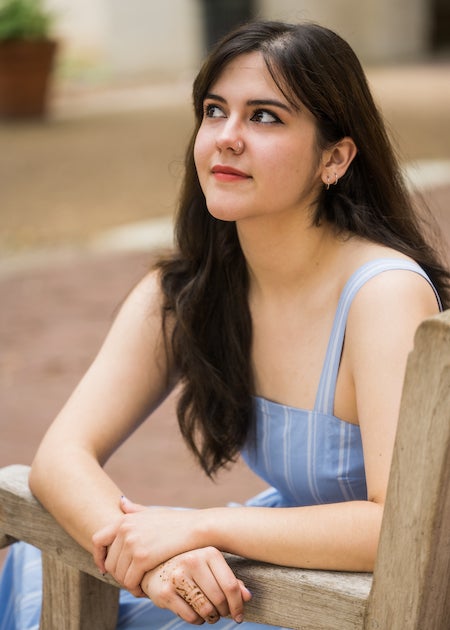
Pauline Huff
Major: History
Certificates: Certificate in Language and Intercultural Communication in Arabic
Residential College: Lovett
Hometown: Harlingen, Texas
Research Area: Gender in Modern Egypt, Gender and Islam
How has being a Mellon Mays fellow impacted your Rice experience?
“When I came to Rice, I was a STEM major, and it was mostly because I felt that I had to be in order to be successful. In talking with Max Murdoch (Lovett College ’20), who was a Mellon Mays fellow at my college … he told me about Mellon Mays and how there’s this whole program that can help you make your goals and dreams a reality through the humanities and social sciences, and there’s a future in these disciplines. I think that definitely impacted me by allowing me to feel more secure in what I'm passionate about because before that, it was very difficult to allow myself to study what I wanted to study, because I felt that I had no support in doing that.”
What lessons have you learned about being a humanities researcher?
“Early on, I still had that sort of STEM mentality of needing to research something that I think other people think is important. And I wasn't happy with what I was studying until I changed it to what I was truly passionate about. And then I found that literally anything can be important and if it's important to me, that clearly means that it will be important to other people as well.”
Is there one course, project or experience that has been most transformative for you?
“I think learning Arabic might be one of the most impactful things that I've done at Rice. It's opened up different relationships that I would not have had with people. A whole other world has opened up and it has allowed me to do research in Arabic, which was really interesting. Even though it takes nearly a decade for someone who speaks a European language like English to become fully fluent in Arabic, being able to use it just a tiny bit within my research has been really important for seeing things from other perspectives. For example, a lot of people were weirdly surprised that Egypt and many countries in the Arabic speaking world had huge feminist movements in the early 20th century because of Western misconceptions of Islam and Arabic speaking countries. And so, it's great to be able to not only be aware of these other histories, but then also be able to read about it from perspectives that aren't translated into English. It just unfolds this whole structure of power when it comes to what is translated and what knowledge is not translated. “
What advice would you give to current and prospective humanities students?
“You need to take classes outside of your major! I tried to spread myself out so that I can learn much more about different modes of thinking, and I think that's so important for a humanities major. [Also] definitely build relationships not only with your fellow students, but also with your professors because they really want what's best for you. I remember being very scared of having meetings with professors and now I look forward to them whenever I have them. Dr. [Paula] Sanders has definitely been like my rock here at Rice and it has been so wonderful being able to be under her wing and learn a bunch of wisdom from her about the academy and our overlapping interests.”
Pauline will begin two years of service in the Teach for America program teaching social studies in the Rio Grande Valley. She also hopes to pursue graduate studies in the humanities in the future.
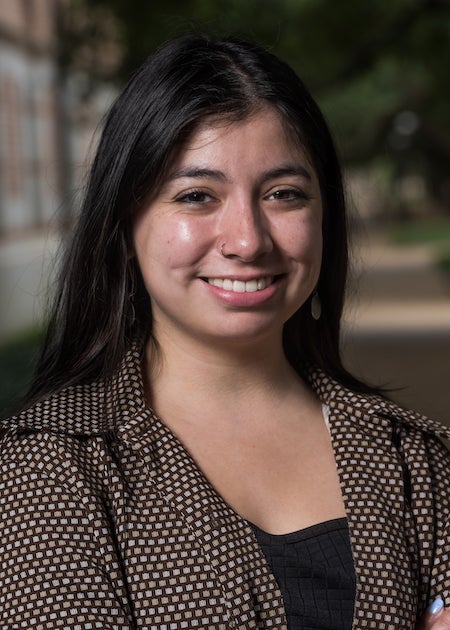
Katelyn Landry
Major: History
Minors: Politics, Law and Social Thought and Anthropology
Residential College: Jones
Hometown: Austin, Texas
Research Areas: Texas Slavery, Public History and Memory
How has being a Mellon Mays fellow impacted your Rice experience?
“One of the most rewarding aspects of Mellon Mays was being able to share my research with people who I knew cared about supporting each other’s academic endeavors. Vice versa, I really valued learning about new fields from the other fellows and being inspired by their diverse expertise. Rice is known for its STEM research, so its humanities and social science research aren’t always highlighted to the same degree — and they should be! Mellon Mays made me feel like a valuable member of a vibrant academic research community and encouraged me to continue finding those communities in graduate school.”
What lessons have you learned about being a humanities researcher?
“There has hardly been a single moment since I became a humanities student that I wasn’t incredibly inspired by the diversity of humanities research. Students and faculty in the humanities do not simply pursue established subfields of history, philosophy, religion, etc., but they create new niches of research and contribute completely novel ideas to scholarly literature. Before I came to Rice, I was under the terribly false impression that all of history had already been written. You do not necessarily need to discover a never-before-seen archival documents to make groundbreaking advances in historical research, for instance. All it takes is looking at things from new, unique, critical perspectives.”
Is there one course, project or experience that has been most transformative for you?
“Being on the SlaveVoyages@Rice Research Team and conducting historical research on the coastwise slave trade to Texas has undoubtedly been my most transformative and valuable experience at Rice. Our extraordinary team of student and faculty colleagues discovered and transcribed records for over 15,000 enslaved people who were forcibly brought to Texas via the Gulf Coast from U.S. ports like New Orleans. I was able to not only build foundational skills of traditional historical research like reading 19th century archival documents, but learn how to make our findings from those documents accessible and compelling to both scholarly and public audiences. We presented our research half a dozen times in venues ranging from academic conferences and showcases to community meetings of local historians, archaeologists, and genealogical researchers. This experience taught me the vast importance of not simply conducting research for research’s sake, but rather to think critically about how to make that research accessible to members of the public who are directly implicated by your work and have similar interests. It revealed to me the highly political stakes and social responsibility of being a historian with the skills and privilege to help the larger community better understand and access their histories, especially marginalized groups whose stories have been absent from dominant historical narratives for centuries.”
What advice would you give to current and prospective students in the humanities?
“Know that there are research opportunities and career options for you that can amplify your passion in the humanities into long-tern projects or pathways that have real impacts on the world both within and outside of academia. While it may be scary to set up a meeting with a professor or attend a conference for the first time, branching out and being forthcoming about your interests is essential for making the most outs Rice’s world class faculty, plentiful financial resources, and academic support networks.
“Also, I have advice specifically for students who are first-generation college students or come from low-income backgrounds: know that you belong here. You are here for a reason and there are so many people who want to help you succeed. You are a trailblazer with just as much intelligence and potential as your classmates who had more resources or support before college. Building trust in a new place with new people can be very scary, but it can be extraordinarily helpful for finding encouragement and support when you need it most.”
Katelyn will participate in the Monticello-University of Virginia Archaeological Field School before applying for graduate programs in public history.
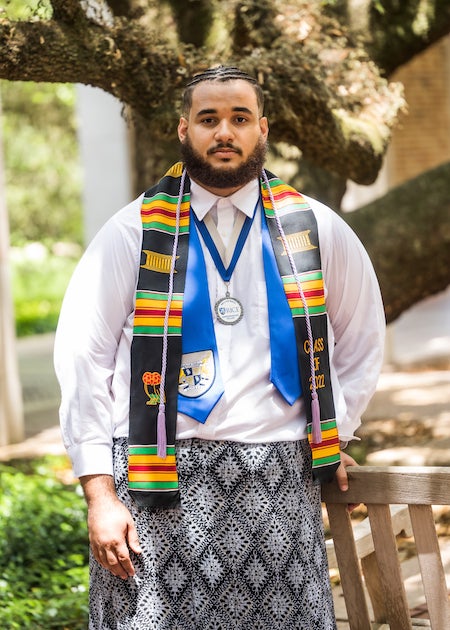
Shifa Rahman
Major: Religion
Minors: French Studies and African and African American Studies
Residential College: Lovett
Hometown: Greenville, North Carolina
Research Areas: Afro Diasporic Religious Traditions, Liberation Theologies
How has being a Mellon Mays fellow impacted your Rice experience?
“Definitely the community I feel like I've gained and you know, the people that I've come across and learned about other research that I've been involved with, I think that has informed me to, you know, that's helped me kind of feel kind of affirmed and where I'm going in terms of like my past also providing me kind of the research and the connection that I have with my mentor, um, you know, which I thought would never really kind of entail for me. And also how, and also, it's really been formed by the amount of both scholarly informed conversations as well as relevant and active conversations, at least to, you know, to the atmosphere of Rice's campus.”
What lessons have you learned about being a humanities researcher?
“I think the biggest thing I’ve learned is to be able to take the skills of putting two completely distinct sources and perspectives into conversation with each other. The other thing I learned is about providing the intention with my research. What are the consequences for why am I participating in this research and what ways can this research benefit us as a whole? These are questions I've learned to ask myself as a humanities researcher.”
Is there one course, project or experience that has been most transformative for you?
“The past two years I’ve spent trying to push the Rice administration to reflect changes in its [social] climate have been very vital for me. The biggest lesson I’ve been able to take away that also ties into my class is the ability to persevere. It also starts with considering how revolutionary just being here is. A lot of what I’ve learned from [courses like] Religion and Hip Hop (RELI 157) and MLK and Malcolm X (RELI 312) has formed a lot of the values that propel what I hope to do after graduation.”
What advice would you give to current and prospective students in the humanities?
“Don't let anyone tell you what you're learning is not important. Know that the research you’re doing is valuable for affirming who you are as human beings who come from different backgrounds and represent more diverse populations. We are doing the work of centering the margins. And that is and that is essential. That's crucial. Also don't let the research as you do, remain just in the academic context. Know that there's an impact for it beyond these hedges.”
Shifa will begin work as the campaign director for the Convict Leasing and Labor Project in Fort Bend, Texas.
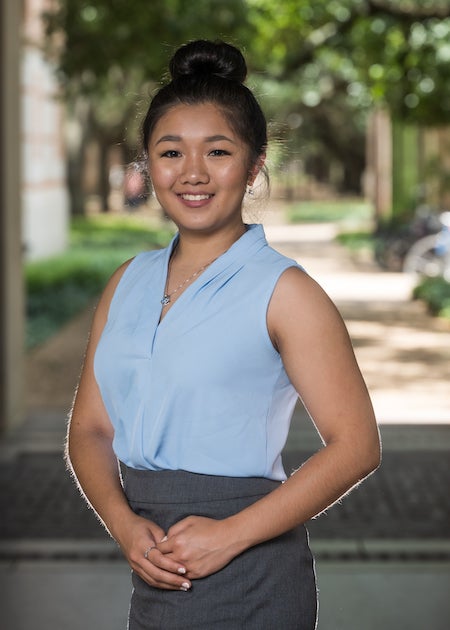
Victoria Saeki-Serna
Major: History
Minors: Politics, Law and Social Thought and Poverty, Justice and Human Capabilities
Residential College: Baker
Hometown: Mexico City and Round Rock, Texas
Research Areas: US-Latin American relations during the Cold War
How has being a Mellon Mays fellow impacted your Rice experience?
“Being a Mellon Mays fellow impacted my Rice experience by giving me a network of people I could rely on to feel supported and to communicate with about some of the same struggles we face as minority students looking into graduate school and trying to break those traditional barriers. The moral support really helped me push through a very rough application season that was defined not only by the chaos of writing statements of purpose and trying to get letters of recommendation, but also doing research for my honors thesis. If it weren't for having those regular meetings on Tuesday and hearing how other people were coping and struggling, but also helping lift each other up, I think my time would have definitely been a lot harder.”
What lessons have you learned about being a humanities researcher?
“Empathy and interdisciplinarity are some things that are very powerful about the humanities. Because it has such a storytelling focus, to a degree, it's very powerful to be able to communicate narratives about traditionally marginalized peoples or countries. The other main things I would say are flexibility and creativity. When I looked into the [National Archive of Mexico] in Mexico City, most of [documents] were classified when it came to my research topic. And so, I really had to learn how to think outside of the box.”
Is there one course, project or experience that has been most transformative for you?
“Broadly, the values of the PHC program, I think, are some of the things that will definitely stick with me the most. As I go into graduate school this coming year, I think a very big focus for me is making history research accessible to policymakers with the understanding that you have to take a holistic approach to policy so that we are going forwards and not backwards. And precisely because of the approach that I take of emphasizing more of the Latin American narrative, I also hope to foster that empathy and that storytelling that the PJHC program really underscored to me in the courses that I took there.
“If I have to point to one there and only one thing outside of that, I think it would be my [honors] thesis because it culminated a lot of the previous research and learning I had done in multiple courses. I combined the lessons I had learned not only from Mexican history, but also Cuban history, U.S. history as well as global Cold War history into a narrative that contributed to the literature by emphasizing Mexico's perspective with the issues of Cuban communism and its place in the Western Hemisphere. I also used a lot of the research techniques that I had learned [and] the interdisciplinary creativity that I took from Dr. [Moramay] Lopez Alonso. It was wonderful to see it all come together in the end.”
What advice would you give to current and prospective students in the humanities? “Follow your intellectual passion even if it is not necessarily the most popular or the most readily accessible, because in the end, it does bring you so much satisfaction to pursue what calls you as a person. And it is very satisfying when you see the end product of something that you are really passionate about, like when I looked back at my thesis.”
Victoria Saeki-Serna will be pursuing a history PhD at Georgetown University in Washington, DC.
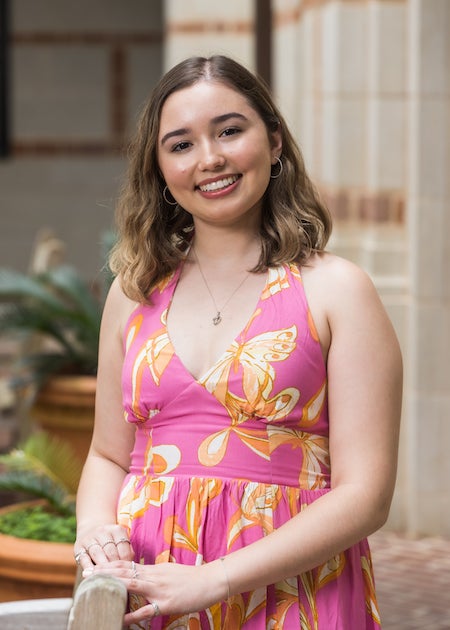
Victoria Zabarte
Major: History
Minor: African and African American Studies
Residential College: Lovett
Hometown: Brownsville, Texas
Research Areas: History of Race and Slavery in the Americas
How has being a Mellon Mays fellow impacted your Rice experience?
“It has completely changed my Rice experience. I came in as a pre-law student and I was invited to apply [to Mellon Mays]. I talked to a professor… and he was like, ‘Try it out. It might change your mind. It might change your life.’
“I did my application and then we were sent home [due to] COVID. I started out for the first year of Mellon Mays on Zoom but being able to meet with people over that first summer of COVID and actually talk about how we were still conducting research over that time made it seem like this is something that really matters to a lot of people. It started really mattering to me and it ended up growing out of that period of stagnation. I realized that I really loved conducting research, especially about people that hadn't been talked about before. It's just changed my whole Rice career because now I want to pursue a Ph.D. in the history of race and slavery, and that's not what I came in doing by any means. It’s been amazing.”
What lessons have you learned about being a humanities researcher?
“At a school like Rice, a lot of things are really focused on STEM, so I didn’t know that there was such a thing as humanities research when I came into Rice. Then I talked to professors like Dr. Domingues — he talked about needing a research assistant and that’s when I realized there is important research to be done. So, if anyone wants to do any sort of research, you can just talk to a professor and see what they think, and you'll probably be able to do that research. It's easier than people think at the beginning, and it's just about finding an interest.”
Is there one course, project or experience that has been most transformative for you?
“Doing research as part of the [History Department] research assistantship and the Fondren Fellows project that it evolved into. Working on the SlaveVoyages@Rice Research Team has been something that I never could have seen myself doing and has completely transformed the last year and a half of my life. We were able to reconstruct this coastwise slave trade to Texas and recenter and refocus on enslaved people. We started out with these documents written in cursive that we were [transcribing], then we started running statistical analyzes and then it became my honors thesis. We've done so many conference presentations and we've been able to talk to local communities like the Afro-American Historical and Genealogical Society and archeological societies. The breadth of this project has just changed my whole outlook on what I've done here at Rice.”
What advice would you give to current and prospective students in the humanities?
“Talk to your professors. That is my most important advice, because if I had stayed in my room all of those days and I was stressed about some work or something, I wouldn't have built those relationships with the professors who pushed me to do more and be a better student and someone who was interested in more than getting grades.
“Also know that there are research opportunities out there. Rice has so many opportunities for humanities students that should be talked about because they're integral to my experience by doing research and participating in the Rice Historical Review, for example. So, I definitely would recommend being open to all the opportunities that the School of Humanities has to offer.”
Victoria will take a gap year before pursuing graduate studies in the history of race and slavery in the Americas.

